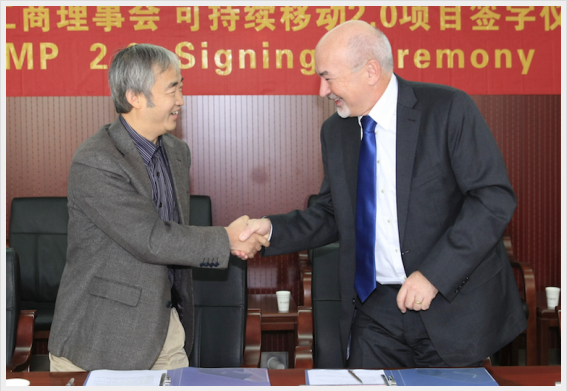
Photo: Wan-Xiaopeng-Michael-Fahy
Chengdu becomes first Chinese city to join global mobility network
05 January 2015
by Richard Forster
The western Chinese city of Chengdu has joined five other pilot cities to work within the World Business Council for Sustainable Development’s (WBCSD) Sustainable Mobility Project (SMP2.0).
The project brings together six global cities that include, Campinas, Lisbon, Hamburg, Indore, Bangkok and Chengdu. In 2013, the project categorised global cities into groups according to their mobility characteristics and nominated the six cities as demonstrator cities to develop a roadmap for sustainable mobility together with city government and WBCSD member companies. It aims to extend access to safe, reliable, and comfortable mobility while being sustainable and reducing traffic accidents.
“Too often solutions that are being implemented do not fit strategic needs of the city and therefore end up failing after considerable expense,” explained Michael Fahy, Director, WBSCD, Sustainable Mobility Project. “By concentrating on the needs of the city and guiding choices through positive impact they will have on the mobility indicators, you ensure a more holistic, multi-modal approach to deliver the city’s mobility strategy.”
Companies that will work with Chengdu include WBSCD member companies, Daimler, Michelin, as well as Deutsche Bahn, the German transport company, among others. The team will produce a roadmap by the end of 2015 for scaling up the implementation of sustainable mobility solutions in Chengdu by using new technologies, systems and management approaches.

“Working closely with the pilot cities gives us the opportunity to learn about their policies and priorities,” Rainer Becker, Head of Business Development Asia Pacific, moovel GmbH/Daimler told Cities Today. “Cities tend to implement restrictive measures to solve their mobility challenges. SMP2.0 creates awareness for innovative mobility solutions and will demonstrate that a constructive citizen-friendly approach will lead to more sustainable solutions.”
Chengdu’s mutilmodal mobility mix already includes metro, bus rapid transit and community buses. moovel/Daimler has already outlined that it will recommend introducing its car2go car sharing scheme, yet Becker is aware that some framework conditions including availability of parking spaces are preconditions.
“Informing the city representatives about these new mobility services and the relevant framework conditions is essential,” he said.
By the end of 2015 the project leaders hope to have refined their tools with all the pilot or demonstrator cities, and are keen to see the programme taken on by other cities to achieve scale.
“Although no decisions have been taken in this regard yet, some of the cities have expressed their interest in an ongoing dialogue,” added Fahy. “They consider collaboration to be key in bringing about real change.”
——————–——————–——————–——————–——————–——————-
Outcomes from Chengdu and other demonstrator cities will showcase:
• sustainable mobility indicators that measure potential solutions to enable cities to better implement sustainable mobility solutions;
• how to develop a detailed roadmap and action plans to improve sustainable mobility in a integrated manner;
• how to apply cross-sectoral solutions that can be scaled up to accelerate progress towards sustainable mobility; and
• the necessary policy accelerators and framework conditions to support rapid and widespread deployment of sustainable mobility solutions.











